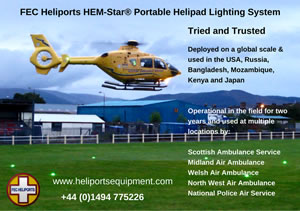Smiths Detection2008-11-13 11:55:50
Smiths Detection Develops Diagnostic Platform for Infectious Diseases
Smiths Detection today announces that it is developing a rapid diagnostic system, initially for use in hospital screening programmes for infectious diseases such as MRSA and Clostridium difficile.
The Bio-Seeq system will provide easy-to-use tests suitable for either a laboratory or Point of Care setting where it can be operated by non-specialist staff. Clinical trials are expected to start early next year.
The technology platform, for which Smiths Detection expects to provide a wide range of tests, is based on the Bio-Seeq portable veterinary laboratory which is due to undergo field trials for Foot & Mouth Disease testing with the UN Food and Agriculture Organization later this year.
Using the clinical diagnostic version of Bio-Seeq, the patient sample is introduced into a disposable Sample Preparation Unit which is then placed on the instrument. No manual sample preparation steps are needed and the unit can process a variety of solid and liquid samples making it ideally suited for combating healthcare-associated infections which kill thousands of patients each year.
A Reagent Pack, inserted into the Sample Preparation Unit, contains all the components for the specific test and includes a bar code used to set up the instrument, further reducing the operator input required. It is anticipated that Reagent Packs for a wider range of tests will be developed, either by Smiths Detection or selected development partners. The tests will use the LATE PCR technique licensed from Brandeis University in Boston, Mass. to amplify and analyse the genetic material of the infectious agent. The power of LATE PCR will be used to detect multiple diseases in each test, and to provide clinically important information such as antibiotic resistance and genetic mutations.
Stephen Phipson, Group Managing Director of Smiths Detection, said: "Our ability to transform sophisticated laboratory technologies into reliable, easy-to-use detection systems is one of our key skills. Applying this to clinical diagnostics is a logical step for us."
Bill Mawer, head of Smiths Detection's newly formed Diagnostics business unit, said: "We have been gratified by the initial response to this technology from medical professionals in the US and Europe. We are developing a powerful, flexible platform suitable for a wide variety of diagnostic tests and are keen to make that platform widely available."
Smiths Detection is seeking partners to co-develop a wide range of tests to run on the Bio-Seeq system.
Smiths Detection today announces that it is developing a rapid diagnostic system, initially for use in hospital screening programmes for infectious diseases such as MRSA and Clostridium difficile.
The Bio-Seeq system will provide easy-to-use tests suitable for either a laboratory or Point of Care setting where it can be operated by non-specialist staff. Clinical trials are expected to start early next year.
The technology platform, for which Smiths Detection expects to provide a wide range of tests, is based on the Bio-Seeq portable veterinary laboratory which is due to undergo field trials for Foot & Mouth Disease testing with the UN Food and Agriculture Organization later this year.
Using the clinical diagnostic version of Bio-Seeq, the patient sample is introduced into a disposable Sample Preparation Unit which is then placed on the instrument. No manual sample preparation steps are needed and the unit can process a variety of solid and liquid samples making it ideally suited for combating healthcare-associated infections which kill thousands of patients each year.
A Reagent Pack, inserted into the Sample Preparation Unit, contains all the components for the specific test and includes a bar code used to set up the instrument, further reducing the operator input required. It is anticipated that Reagent Packs for a wider range of tests will be developed, either by Smiths Detection or selected development partners. The tests will use the LATE PCR technique licensed from Brandeis University in Boston, Mass. to amplify and analyse the genetic material of the infectious agent. The power of LATE PCR will be used to detect multiple diseases in each test, and to provide clinically important information such as antibiotic resistance and genetic mutations.
Stephen Phipson, Group Managing Director of Smiths Detection, said: "Our ability to transform sophisticated laboratory technologies into reliable, easy-to-use detection systems is one of our key skills. Applying this to clinical diagnostics is a logical step for us."
Bill Mawer, head of Smiths Detection's newly formed Diagnostics business unit, said: "We have been gratified by the initial response to this technology from medical professionals in the US and Europe. We are developing a powerful, flexible platform suitable for a wide variety of diagnostic tests and are keen to make that platform widely available."
Smiths Detection is seeking partners to co-develop a wide range of tests to run on the Bio-Seeq system.
For more information contact:
64 Clarendon Road
Watford
Hertfordshire
WD17 1DW
United Kingdom
Tel: +44 1923 696555
Fax: +44 1923 696559
